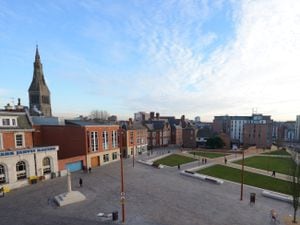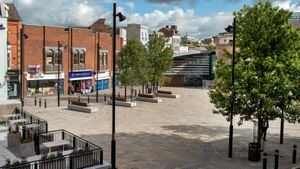A tale of two cities – Wolverhampton should learn from Leicester's reinvention
Crowds beat a path to Jubilee Square, the beating heart of a revitalised city. At Christmas, 10,000 visitors made use of an ice rink, and it was the centre of last year's Platinum Jubilee celebrations. And as the summer draws nearer, it will be the focus of dozens of festivals and events that will bring in countless visitors.

"Twelve years ago it was a small car park and a very large bus layby," says Sir Peter Soulsby, the driving force behind the scheme.
Sir Peter is the elected mayor of Leicester, a city which a decade ago was in a similar position to Wolverhampton – a former manufacturing powerhouse struggling to find a new role in the 21st century.
"It was having a collective inferiority complex," says Sir Peter. "Leicester was a city that was lacking self-confidence and pride.
"We couldn't believe it had anything special to offer, we couldn't understand why somebody would want to come to visit."
According to the last year's Good Growth for Cities report by consultancy firm PWC and the think-tank Demos, Leicester achieved an rating of +0.28 for its overall growth potential, compared to a score of zero for Wolverhampton and Walsall combined. Later this month, Leicester will take another huge leap for mankind with the launch of its Space City, the UK’s definitive cluster dedicated to space research, production, manufacture and development.

"Pride in the city has been totally transformed over the last 12 years," Sir Peter says. He adds that demand for hotel rooms in the city centre has rocketed as people come to see what the city has to offer. And Sir Peter says there is no reason why a city such as Wolverhampton cannot reinvent itself in a similar way.
It has helped, of course, that the remains of King Richard III were discovered beneath a Leicester car park in 2013, followed by Leicester City's title win in 2016. But Sir Peter points out that both he and the city council acted swiftly to capitalise on these opportunities.
"As soon as the body of Richard III was discovered, we bought the building next door to get a visitor's centre," he says.
Last month Wolverhampton businessman Henry Carver announced he would be stumping up £30,000 of his own money to finance research in how best to rejuvenate the city. The city has been struggling since plans for a £300 million new retail development at Summer Row collapsed in the wake of the 2008 financial crash. Then in 2016, the £55 million Westside leisure development was revealed for land between Penn Road and Darlington Street, but last year it was announced the scheme would be heavily scaled back.
Wolverhampton Council is now pinning its hopes on a £15.7 million scheme to pedestrianise Victoria Street, create a new public square and also a £6.5 million 'box park' for informal alfresco food and drink. Not unlike the plans for Leicester's Jubilee Square, then.
Sir Peter describes turning the dismal-looking car park and bus terminus into a bustling public forum as a crucial turning point in the city's fortunes.
"People said it wouldn't work, they said it would be a disaster," says Sir Peter.
"People were worried about the loss of the parking.
"I was prepared to take a risk, and take the consequences if it didn't work. But nobody now wants their car park back."
Sir Peter says connecting the city's different landmarks and attractions, has been central to the city's transformation, removing some of the obstacles that separated them. Creating attractive public squares, using high-quality materials, with pleasant pedestrian routes linking them together, has been a major part of the plan. Buildings which had come to the end of their useful lives, including the former council offices at New Walk Centre, were demolished to open up the vista.

All this will probably be music to the ears of Wolverhampton's planners, who have also identified public spaces as crucial to regeneration.
"The city was like a desert, we had a few green oases, but they weren't connected with each other," says Sir Peter. He believes that the proposal for a Wolverhampton 'box park', selling food and drink from shipping containers, is a sound idea, and says he hopes to do something similar in Leicester.
In recent months Leicester has secured £55.2 million from the Government's Levelling Up fund, which will be used on projects to improve the railway station, aid development at a hi-tech business park, and to redevelop the landmark Pilot House into an enterprise centre for tech entrepreneurs. A further £12.2 million bid is also pending to fill in the city's last remaining pedestrian underpass, and improve surface-level crossings.
The latest round of grants from the Department of Levelling Up sparked claims that areas of the Midlands and the North had been overlooked in favour of those in the south of England. Sir Peter says delivering on the early projects has been crucial to securing further funds from both the Government and private investors. He says the Government is much more willing to invest in projects where work can begin immediately, and the benefits can be quickly realised.
"You have got to show them that you can deliver it, so they will have the confidence to invest in you."
But Sir Peter says the other crucial advantage Leicester has had over other similar cities it the position that he himself holds, as the directly elected mayor.
"I've seen it from both sides, I was leader of the council for 17 years, but you don't have the authority that goes with an elected mayor," he says.
"We are one of the few cities in the UK that has a directly elected mayoral system. There are one or two others, Liverpool, Salford, and Doncaster, but in the main it is mostly regional mayors.
"The advantage that an elected mayor has is the ability to provide a clear vision of what we set out to achieve, a vision that would take several years to be realised.
"You need to be able to take a risk, and if it goes wrong, people know who to blame."
He says the role has also helped him to build up a relationship with government ministers, officials, and business leaders.

Matthew Hammond, Midlands representative of consultancy firm PWC, said Leicester had consistently performed well in the the Demos-PWC Good Growth for Cities Index, which ranks 50 of the UK’s largest towns and cities based on 12 measures of economic wellbeing. In the 2022 index, Leicester was ranked 14th, compared to the Wolverhampton & Walsall combined area which took 28th place.
"The index showed that there are opportunities for Wolverhampton and Walsall to improve on new businesses, skills and jobs," said Mr Hammond.
"Each individual city will face its own unique set of challenges and priorities that will need to be addressed through innovative, imaginative and tailored solutions."
He said cities in the Midlands relied more heavily on manufacturing, retail and real estate account for larger sections of their regional economies compared to other areas.
"As the research suggests, this contributes to a slightly below average overall rate of economic growth in the region.
"That presents both challenges and opportunities for the local business community with the identification of growth opportunities."
Mr Hammond says the West Midlands has seen a surge in 'green' jobs in the past 12 months, having doubled since November 2021.
"Employers in the West Midlands have an opportunity to innovate and consider how their operations can become greener, particularly in the manufacturing sector that represents a high proportion of the Midlands economy," he says.
"Embracing new, greener technologies and investing in skills will provide benefits for business operations and more employment opportunities in the region, as well as making a difference to the environment.”
It should be pointed out that when Sir Peter became mayor of Leicester, the city already had one crucial advantage over Wolverhampton.
While the financial crash put paid to Summer Row, Leicester's £350 million Highcross shopping centre had been completed just a few months earlier. With John Lewis as its anchor, the centre boasts big-name stores such as Tag Heuer, Hugo Boss, Ted Baker and Dune which Wolverhampton would give its right arm for. The city has not been immune from the decline in retail – like many other cities, it has lost its branch of Debenhams, and Sir Peter says the city will have to adapt to the challenge of out-of-town retail parks and the internet.
But he believes there is still a place for the traditional town centre – as long as it can move with the times.
"The one thing that makes city centres so dramatically different from either shopping online or going to an out-of-town shopping centre is their history and character," he says. "Making them feel welcoming and secure, that is the challenge of all city centres





